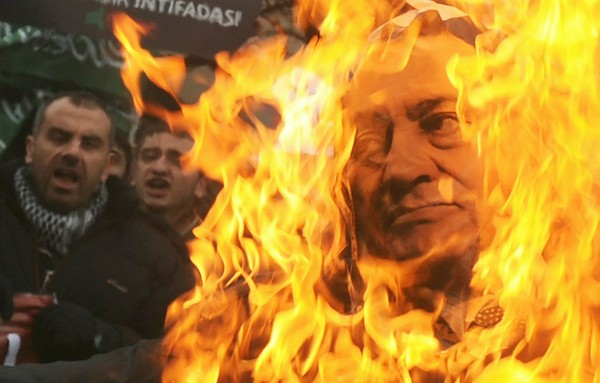Food: What’s really behind the unrest in Egypt
By JEFF RUBIN, Globe and Mail Blog
Posted on Wednesday, February 9, 2011 6:21AM EST It’s more than coincidence the Arab world is convulsing with social unrest just as the United Nations Food and Agricultural Organization’s widely watched price index recently soared past the previous food price peak set in the summer of 2008. After all, didn’t those same prices ignite food riots throughout the world only three summers ago? When 40% of your population lives on less than $2 per day, soaring food prices isn’t about cutting back on luxury spending. This is particularly telling when record prices include basic grains such as wheat, of which Egypt is the world’s largest importer. Suddenly, it becomes a lot more difficult for the roughly 30 million Egyptians living on that $2 per day to stomach their three decade dictator, Hosni Mubarak. Similar popular indigestion, triggered initially around food prices, sent equally beloved Tunisian strongman, Zine El Abidine Ben Ali, packing all the way to exile in Saudi Arabia. And when food riots recently broke out in neighboring Algeria, not only did three-term president Abdelaziz Bouteflika suddenly see fit to lift a 19-year stage of emergency but, more important, he told his government to order a record 800,000 tonnes of wheat. Algeria is not the only country in the region to start bulking up on its food inventories as a hedge against future food protests that could easily morph into popular revolutions. Everyone in the region is doing it, including supposedly stable Saudi Arabia, which recently announced plans to double its wheat inventories. And it is not just Arab nations feeling the pinch. Food riots are sweeping across the developing world, encouraging similar hoarding elsewhere. Bangladesh and Indonesia placed record rice orders; the former doubling its order, while Jakarta quadrupled its rice purchases. And China may soon be joining the fray. Severe drought in the north is having a disastrous impact on the country’s winter wheat harvest. This has left the ground extremely dry for spring planting. If China, normally self–sufficient in wheat, becomes a significant importer this year, world grain prices could go a lot higher. …
Food: What’s really behind the unrest in Egypt 
By Stephen Markley
1 February 2011 The dictator of Tunisia has fallen and it appears possible that Hosni Mubarak’s 30-year reign may also soon come to an end, and for all those cheerleaders from both the Bush and Obama administrations claiming credit–not to mention social media nitwits who think Twitter is fomenting democratic revolution–please shut up. As usual, the media’s grasp of what is happening is either willfully ignorant of the facts or downright naïve. The story is, of course, who’s scoring political points. “Obama’s ‘Shah Problem’: President Obama is doing what Jimmy Carter did with Iran in 1978,” read one headline of a missing-the-point op-ed. Make no mistake, the movements to oust Tunisian President Zine el-Abidine Ben Ali and Mubarak are extremely bad–even terrifying–news. Now obviously I’m a big old lefty and believe that like Winston Churchill said, democracy is the worst form of government except for all the others. People should of course have the right to elect their leaders and live under governments of their choosing. This should of course be a global goal and a major foreign policy objective of the United States. But what we are seeing in the Middle East and northern Africa is not a thirst for democracy but a revolt spurred by high food prices. After all, Tunisians and Egyptians have been living under authoritarian rule for ages more or less without a peep. They were as stable as countries in that region tend to get and functioned relatively well (by which I mean, compared to like Yemen). Now, however, food prices in both countries have spiked. On the one hand, it’s very possible that this could lead to historic political reforms. Both countries could become functioning democracies overnight for all I know. However, a democratically elected government will no more be able to control the price of food than a dictator could. The underlying instability will remain, and this instability is extremely dangerous. According to the U.N. Food and Agricultural Organization (FAO), which tracks world food prices, the FAO Food Price Index leapt 32% in the second half of 2010. This beats the previous record of 2008 when food riots broke out across the world and Haiti and Somolia burned. There are three main reasons food prices have spiked. First, the world’s population is getting bigger. Second, the price of oil has again risen into the economic danger zone. I’ve written about peak oil before, and however you may feel about that theory, it has become evident that the symptoms of an approach to peak oil have begun to crop up–if not the catastrophe itself. Finally, the most important reason in spiking food prices: extreme weather events. Climate change “skeptics” and deniers may want to take note of this next part. This summer saw wildfires in Russia that destroyed hundreds of thousands of acres of grain. Floods in Pakistan, Bangladesh, and Australia devastated those countries’ crops. Dry, hot weather incinerated Argentina’s soybean crop–one of its most important exports. Even in Canada, heavy rains took a brutal toll on the country’s wheat. …
Why the Egyptian Uprising is Extremely Bad News
I'd just like to point out that food prices are only a contributing factor here, one among many. I'm surprised to see the Markley piece reposted here, it being overly simplistic on the politics and simply a rephrasing of other items around at the moment.
Love the work. Peace and appreciation,
Matt.